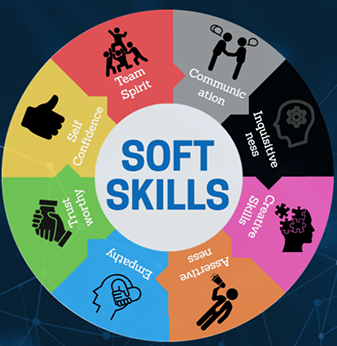
Top 7 Soft Skills That Can Boost Employability in 2019 and Beyond
Date: 14/02/2019 | Posted by: MeritTrac | Category: Employability , Soft Skills , Education
The fourth industrial revolution is redefining the very concept of work. Employees in 71% of Indian companies are already using Robotic Process Automation (RPA) and AI-based augmentation. It is predicted that five years from now 35% of skills that are considered important today will be redundant. This has significant implications for both employers as well as employees.
As emerging technologies such as advanced robotics, artificial intelligence and machine learning create new job roles, businesses with an agile workforce and the right skill sets will outperform. To future-proof their workforce and drive business growth, organizations will need to speed up upskilling/reskilling, redesign work processes, and strengthen the talent pipeline through scientifically designed assessments. Similarly, employees who proactively equip themselves with the right domain skills and soft skills will stand out in a crowded job market, significantly enhancing their employability.
What are the Top 7 Most Important Soft Skills Employers Look for?
When it comes to recruitment, there are 7 soft skills that act as identifiers of an employable person. These skills can be innate, or they could be developed through practice. While domain skills are of paramount importance to do a job, it is these soft skills that determine an individual’s ability to grow in their respective job roles. As workforce transformation takes on urgency, what skills should employers and employees look at in order to thrive in the new digital reality? Here are the top seven must-have soft skills for employability identified by the World Economic Forum (WEF) for success in 2019 and beyond:
- Complex Problem Solving
- Critical Thinking
- Creativity
- People Management
- Communication
- Coordination
- Emotional Intelligence
Complex problem solving: 36% of all jobs across all industries will require complex problem-solving abilities as a core skill by 2020. Leading companies such as Deloitte and Google look for candidates with strong ideation, reasoning and creative problem solving to drive effective decision-making. Similarly, professionals in industries such as healthcare will require human reasoning capabilities as a top soft skill to arrive at the desired results, even in the face of increasing automation.
Critical thinking: As automation increases, demand for employees with strong logic and reasoning capabilities will surge. The ability to recognize assumptions and identify certain details is essential for directing automation optimally in industries such as manufacturing. This soft skill is also useful in sectors such as financial services in improving customer interactions and service through targeted recommendation of products and services. Citibank, for instance, assesses candidates on critical reasoning and numerical reasoning skills during hiring.
Creativity: Creativity and design-led thinking play a critical role in conceiving the solutions of tomorrow. Companies that proactively encourage creativity fuel innovation and excellence across the value chain by attracting top notch talent. RMSI – a global IT service company - has been ranked the best company to work in India for its ability to nurture employee creativity and excellence.
People management: Effective leadership, both at a personal and at the organizational level, means managing people so that they not only enhance work efficacy but also add value to the organization. Leaders at IT giants like Cisco and Wipro manage their people and their performance through sync-up conversations and instant feedbacks.
Communication: 32% of Indian companies rank communication as the most important skill to have. Good communication practices ensure timely responses and set clear directions for enhanced productivity. Upskilling in communication has been shown to result in better job satisfaction, improved company performance and increased productivity. Case in point: 3000 Indian garment workers showed 20% more productivity when upskilled in communication and other soft skills.
Coordination: Collaborative, personalized and culturally attuned behaviors will take center stage in the 2020 workplace. Forward looking companies recognize this. At Godrej, the consumer products giant, managers and business heads come together to solve live business challenges in a collaborative mode. Collaboration, between humans and machines, is also a critical component in age of AI. Such collaborative intelligence increases the likelihood of companies prioritizing their strategic goals by 30%.
Emotional intelligence: Concern for others, cooperation and social orientation are soft skills that robots cannot automate. Hiring and training for emotional intelligence will therefore be a high priority for organizations in 2019 and beyond. Indian Railways is driving emotionally intelligent leadership through general workshops for driving qualitative impact on productivity and the well-being of its large workforce.
Conclusion
Clearly, these 7 soft skills are a must for any individual who has to work with a team or interact with customers as part of their job role. Soft skills are also increasingly be valued on par with hard skills in the workplace of the future. Organizations and candidates alike who shift their focus to the skill requirements of the future will emerge as the winners in the new digital reality. MeritTrac offers assessments that enable recruiters to measure all the 7 soft skills along with core domain skills. You can also customize the test to analyze specific soft skills for employability as per the job requirement. Some of the top soft skill assessments offered by MeritTrac include problem-solving assessment, emotional intelligence test, creativity test, critical thinking test, etc.
Sources:
- analyticsindiamag.com
- weforum.org
- graduatesfirst.com
- jobtestprep.com
- hrexchangenetwork.com
- economictimes.indiatimes.com

Online soft skill assessments can help recruit candidates with the right mix of hard and soft skills
Soft skill assessments can prove useful both in campus as well as lateral recruitment. They can help
assess the desirable skills that a prospective employee should possess in order to be successful in
the job role.
Handpicked Articles for Futher Reading
Relevant Case Studies













 Sales Hotline: USA: +1 646 916 0939 / Others: +91 80619 14700
Sales Hotline: USA: +1 646 916 0939 / Others: +91 80619 14700


